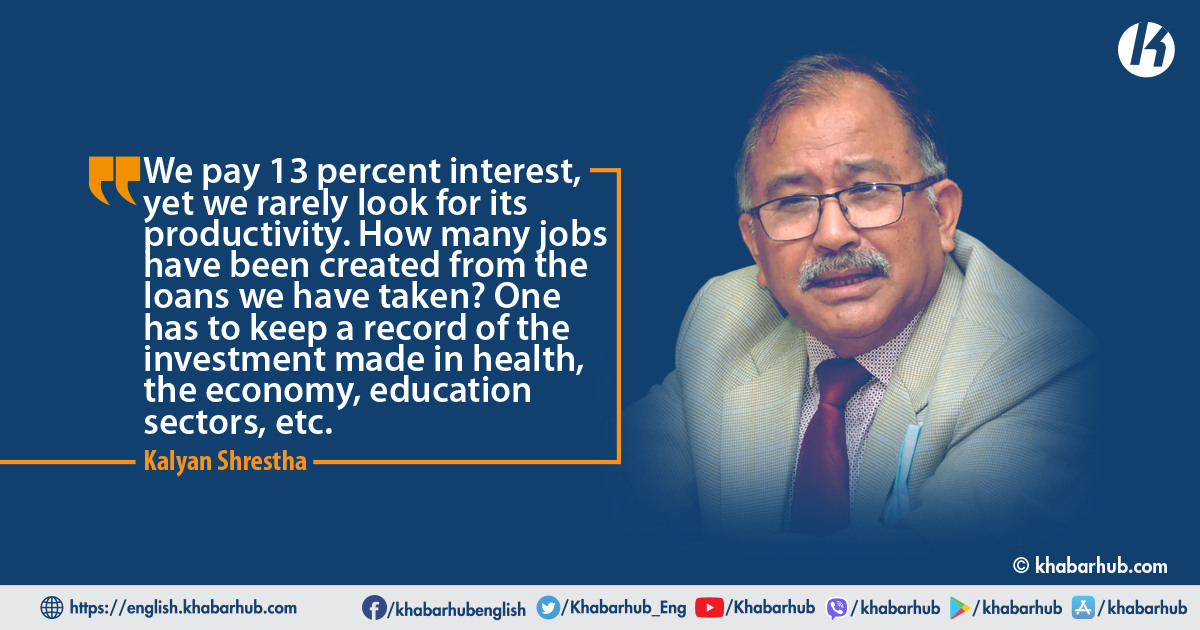Coronavirus ruined everything, every sector. Ukraine spoilt all central food supplies. The energy crisis is there as well. Its effects are many, we have to deal with it whether we can or not.
Looking at the index of the economy, if we consider the ratio of our revenue and expenditure, we see that the revenue could not even support the expenditure.
We only wrote very big things in the constitution. But it didn’t match anywhere. When the economy is poor, democracy cannot be dignified. Democracy does not get promoted only by writing down rights.
As the expenditure is more than our revenue; imports are too high, and we could not sustain agriculture, industries and even children. We have made a strategy to make agriculture a sustainable base by making agriculture sterile and getting remittances!
There is no assessment of the damage done to agriculture, industry, social security, justice and peace. We take loans. What is the obligation to take that loan? What are the provisions?
The government should consider it as a separate concept. It has to be defined. It should have a separate structure and process. A law has to be made regarding loans. Rules have to be made. We should take loans only in areas that we could manage.
We have not conducted any research yet. The state may not have the ability to take the risk where it takes a lot of money and time; the state has to take the private sector together with it. Otherwise, there may not be the ability to build capital.
The state will set up the infrastructure for that purpose. Entrepreneurs are told to run their own industries. Everyone takes a loan. We have taken internal loans rather than external loans. We borrow a lot. But we do not understand what its purpose is.
When 43 percent of GDP is debt, we cannot claim we are free. Where are we from loan costs to loan results? We call it an increase in the level of secondary education, but is there an increase in education? There should be 10 percent more to pass the exams.
One does not consider the dropout, or the need to enhance the ability of the teachers. The schools are shut down not getting enough students.
If it is a loan taken for secondary education, where was it used? Where was it invested? It should be accounted for.
If we take a loan due to the fact that we cannot afford even simple expenses, what should be the pattern of our loan consumption? What should be the pattern of the economy and how should this allocation be? What should it be? First, our country cannot be called a poor country.
From the prime minister to the mayor, there are many expensive vehicles for elected representatives and government officials. And, some of the projects taken from the loan have cost a lot of money, who gave permission to do that?
No matter how many years we have to pay for it. The son and grandson must pay. We had to take that loan. There was no other alternative. There were no alternative loans in the loans either.
A loan has been taken to pay the interest on the climate change program. We are the people who contributed to that carbon trade. We are the country with the least industrial sector. We cannot contribute to pollution even if we wanted to.
Are we going to pay for that? Is it necessary from a moral point of view? Is it necessary from an economic point of view? What is this talk about? We can’t talk about it.
Our future economy must be fueled by productivity. We cannot control the economy in any other way. Therefore, there should be a special opinion, law, and rule about loans.
We pay 13 percent interest, yet we rarely look for its productivity. How many jobs have been created from the loans we have taken? One has to keep a record of the investment made in health, the economy, education, etc.
How much loan has been utilized in which place? Where was the investment made? People should get information about it. There is a loan officer. But shouldn’t there be a commission? There should be a loan commission. The state has to say that this loan can be taken; this one should not be taken.
The government should consider it as a separate concept. It has to be defined. It should have a separate structure and process. A law has to be made regarding loans. Rules have to be made. We should take loans only in areas that we could manage.
What will the Ministry of Agriculture do if it does not produce even one mana of rice? What will the Ministry of Forestry do that does not increase even one percent of the forest? What to do with an industry that fails to produce even one kilo of goods? What to do with such industrial policy, and education policy?
Our future economy must be fueled by productivity. We cannot control the economy in any other way. Therefore, there should be a special opinion, law, and rule about loans.
(Excerpts on the basis of Shrestha’s opinion at an interaction held at Pavilion Hall, Durbar Marg, Kathmandu)









Comment